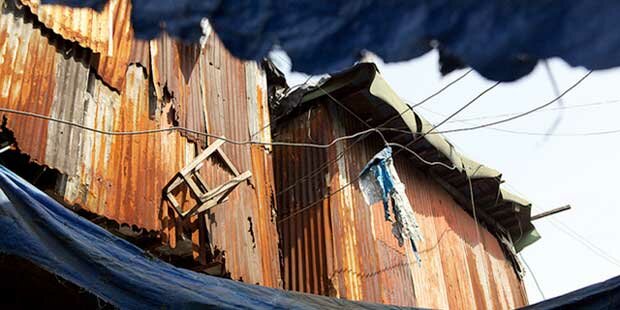In July, a mob of workers at a Maruti car factory in Haryana, India lynched the factory’s Human Resources manager, burning him to death. Reporters with India’s Hardnews later published this revealing piece on the living conditions of factory workers in the area.
In the dilapidated and dingy villages hidden around the gigantic and sprawling post-modern structures of big capital and industry, the sad story of the workers and their miserable lives move in a vicious cycle of inevitable destiny. In Aliyar and Dhana, urban villages near the Maruti Suzuki auto plant in Manesar, the cinderblock architecture is ugly and depressing, made worse by the squalor, open drainage, flies, stink and garbage of these inner lanes. An assortment of empty, pathetic shops selling samosas, sweets, cold drinks, groceries, Chinese mobiles and fruit juice attract few customers.
Trapped in a time warp, this grey ‘inner city’ is untouched by the tentacles of desire, profit and insatiable wealth, which so transparently mark the opulent and swanky industrial hub of national and multinational capital in the neighborhood. An orthodox, backward urban village, has not a single streak of green or earth, and is dotted with little hovels and naked children gazing longingly at sweets buzzing with flies. In this ghetto, hidden inside the intestines of the golden zone of big brand business, even bottled water is from an unknown company called ‘Famous Life.’ The contrast between the progressive industrial hub and this feudal urban ghetto is transparent and stark.
The upper caste landed ‘gentry’ have made huge profits by selling their land to big business groups. Those who sold their land for Rs 2.5 lakh an acre a decade ago are now complaining that they have been short-changed. In the village, by contrast, there is one hour of electricity, no drainage or sewer system, no primary health care center, not even a college in the vicinity. Most youngsters are uneducated, not interested in higher learning, and detached from the nuances or challenges of a changing modern economy. The place stinks of shit and garbage. And illiteracy.
In this distorted space of underdevelopment, where the villagers have no link with agriculture or ecology anymore, the upper caste gentry is loaded with big bucks. The sarpanch [an elected official head of the village]of Aliyar, Ishwar Singh Chauhan, has a palatial house amidst the squalor and filth. The upper caste exploit the new industrial boom, directly benefiting in a number of ways: this dilapidated urban village’s political economy runs with assistance from Maruti Suzuki and other companies. Although they claim to be farmers, instead they are landlords, shop owners, profit makers, commission agents, contractors, and middlemen all thrown in a money-making mix.
On July 25, 100 ‘village’ panchayats [local governing officials]passed a resolution saying that they want peace to be restored, the guilty to be punished, and that they stand with both the management and the workers at the Maruti plant. However, they previously took a categorical pro-management position, stemming from their crucial position in the well-oiled wheel of worker exploitation and the miscellaneous benefits acquired due to the growth of the industrial hub. In sum, the panchayats are the beneficiaries of industry and the workers are victims.
Maruti and other companies, to whom the gentry sold their ancestral farmland, employ not a single one of the gentry or the panchayats. Companies don’t hire them because they fear their potential localized muscle and clout. They don’t have skills or desire to learn. Their inheritors and sons are involved in subsidiary, parasitic businesses: contracts, transport, shops, rooms for rent, etc. The sarpanch’s sons, for instance, run a transport business- they also own the highly lucrative contracts of as many as 16 liquor shops, as the sarpanch himself informed Hardnews.
Amidst this primitive political economy, in just the two villages of Aliyar and Dhalla (there are 60 plus similar villages), more than 5,000 workers live in sub-human conditions, including many Maruti workers. At the entrance of this dirty village surrounded by an expanse of rotting garbage, lay rows of little, dark, deathly, suffocating cubicles made of concrete with tindoors. In one such hovel, four workers share aroom. If they want to cool down, they need to buy both the fan and the electricity, not to mention paying the water bill. Sometimes thirty-plus villagers will share one toilet. Many gather together to cook collective meals.
The monthly rent for a room is Rs 3,000 (US$55) or more and contract workers earn Rs 6,000/ month, though some permanent workers also live in these ghettos (entry level apprentices earn about Rs 4,800). There are no housing facilities in the Maruti plant; nor do contract workers have any savings funds, gratuity, medical coverage, and educational or social security benefits. They work in the same premises with the permanent workers, sharing the same workload. Permanent workers earn around Rs 17,000 to 20,000. As in Maruti, most factories choose to employ contract workers because they work as hard as anyone, have no rights or job security, and earn an abysmally low salary.
Aliyar is filled with huge concrete blocks with holes in the wall and little dark rooms where hundreds of workers are packed like sardines. One concrete block had 500 workers, while another had 200. Most of them are migrants from Haryana, UP [Uttar Pradesh] and Bihar. After the fire on July 18, Maruti workers packed their meager belongings and fled, leaving village buildings vacant. Locals say they had no clue that an official had died in the plant. At least 40 workers remained behind, so the village panchayat and pradhan promptly handed them over to the police.
“The police asked us to hand over the workers. What can we do? We got the workers arrested. These workers did not run away. They are innocent. The guilty must have escaped. Only the innocent got caught. The guilty are never caught,” said Ishwar Singh Chauhan, sarpanch [chief of]Aliyar village.
Amit Sengupta and Sadiq Naqvi
06 Mar 2013




































